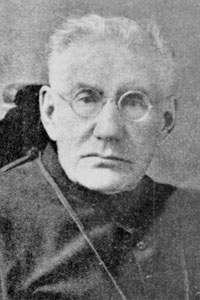
Joseph Moffet
Having arrived in Temiscaming at the age off twenty, Brother Joseph Moffet stayed in that area for fifty-seven years (1872-1929). He became famous especially for his contribution to the development off Ville-Marie and the surrounding parishes. Throughout his career, he showed himself to be an ingenious organizer and clever overseer, never at a loss for means to carry out the most difficult jobs and successfully complete even the most daring undertakings. His many services to the colonists earned him the title of “Father of Temiscaming”, while the Amerindians called him Maïakisis, “The man who rises before the sun.”
Times were hard and the roads dreadful. During his many trips between Mattawa and Ville-Marie, in summer as in winter, the Brother had to face all kinds of difficulties. Known for a hundred miles around, for twenty years he was the supplier of the colonists and logging companies of the area. Everyone relied on his competence for the purchase and transport of fodder, grains and other goods. Having no branches in Temiscaming, the managers of the Bank of Mattawa were accustomed to entrusting Bro. Moffet with the delicate mission of transporting the money necessary for the wages of the several thousands of loggers in the North. To thwart possible swindlers, the Oblate had recourse to a trick. On his sledge, mingled with bags of grain, one could see what appeared to be ordinary round bundles which, however, his sharp eyes watched attentively. The porters suspected nothing of these precious deposits. At the various relays, the brother himself removed the bags of money from his load and entrusted them to the hotelkeeper with this ruse: “Put them in a safe place. It is medicine for the horses.” The instructions were scrupulously respected and relay after relay the money made its way without a hitch.
An agent of the McLaughlin Company came one day to ask Bro. Moffet if he would agree to transport from the end of Lake Temiscaming to Lac des Quinze an immense boiler for a steamboat. Fr. Eugene Nadeau tells us of the adventure in these terms: “The distance was 75 miles (120 km), including 50 on the lake and the remainder by land. He offered the brother 50 dollars. He, considering the wages little in proportion to the risks of the job, asked for 75. The company thought of granting the contract to another. The following day, however, the agent returned and promised the requested price. “Sir, answered the Oblate, you know that one day less in March means a lot: it is now a hundred dollars!” A new refusal. So someone else was found for the project. But they had hardly set out when a breakdown left the boiler stranded on the lake. Our man thus, with some embarrassment, had to approach the brother for a third time. They would pay the hundred dollars now if all arrived in time and in good condition. “Sir, retorted the brother, wrinkling his eyebrow, this is serious business! This failure frightens me. It is now 200 dollars!” “Agreed, you will get it!”
Responsible for the boiler, the brother started by hermetically sealing it at both ends, inserting as many pegs as there were openings. This way, if the ice suddenly yielded, the kettle would float. Then he tied a whole serious of strong tree trunks over the runners of his sledge, thus transforming it into a kind of large snowshoe to support the load if one of the blades suddenly cut the ice. Four horses pulled the heavy load of cast iron. In three days, the kettle arrived at its destination and the company was happy to give the Oblate his 200 dollars, convinced in the end that his daring had saved thousands for the McLaughlin Company!”
André DORVAL, OMI
